What is personal branding? It is not only about creating a professional image, but also about positioning your own values, voice and mark in the eyes of others. This article will help you understand why personal branding becomes the key to opening up opportunities and influence in the digital age.
Table of Contents
What is personal branding?
Building a personal brand is the journey of shaping and expressing your unique, professional and consistent image, helping others clearly see the value, capacity and passion you bring. Nowadays, the labor market is increasingly competitive, owning a strong personal brand not only helps you stand out but also builds trust, expands relationships and grasps more career and business opportunities.
Simply put, businesses have brands to differentiate their products/services in the market, personal brands to differentiate your value among millions of other talents.
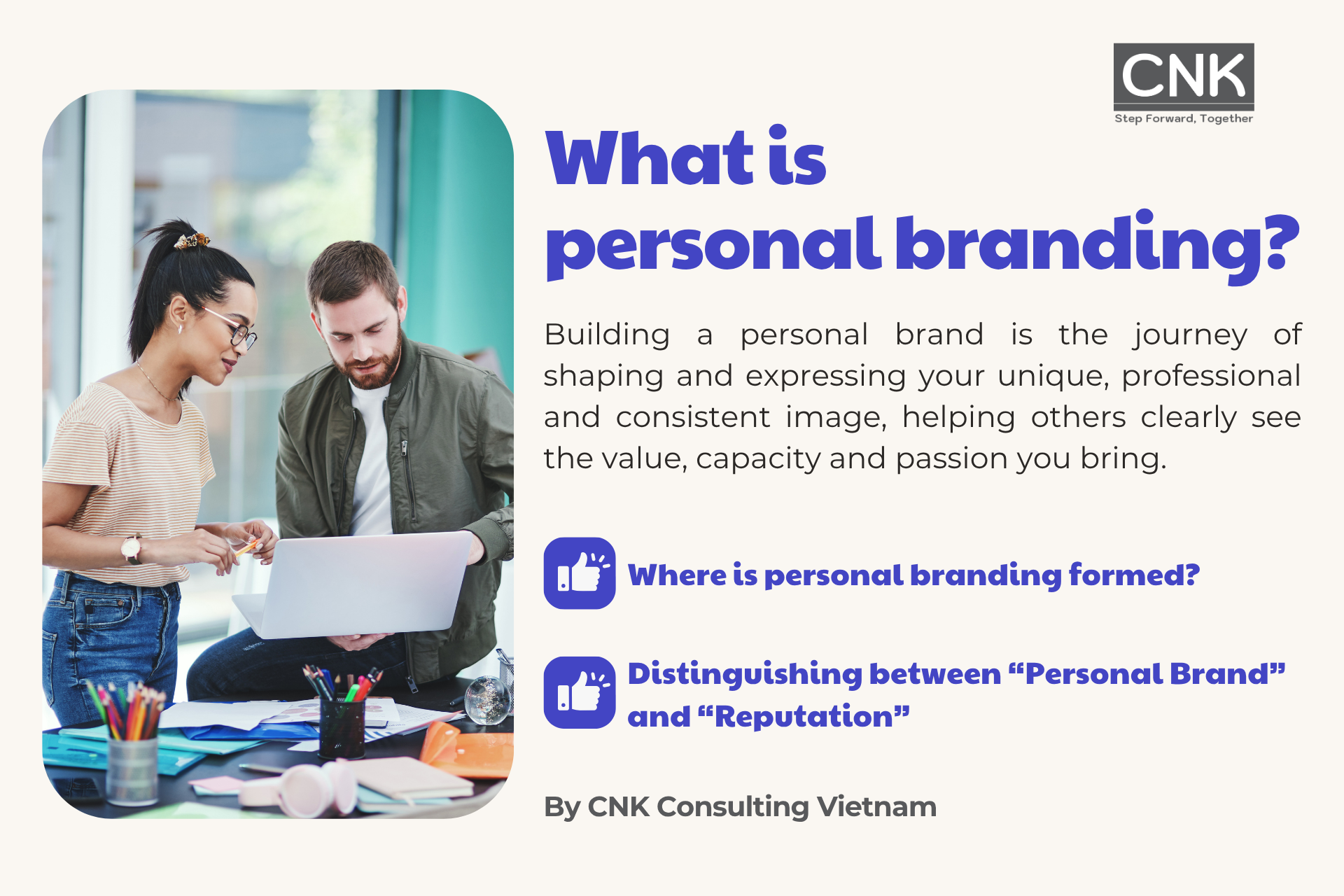
>> Learn More: 10 Powerful Personal Branding Examples to Inspire You
Where is personal branding formed?
Personal branding is formed from the harmonious and consistent combination of the following tangible and intangible elements:
- Core Values: These are the beliefs, principles, and ideals you hold dear, such as honesty, innovation, or sustainability. They reflect the essence and ethical foundation of your personal brand.
- Expertise and skills: Showcase the areas you are knowledgeable about, the experience you have accumulated and the problems you can solve. This is the “foundation” of your brand, helping you affirm your value and capacity in the eyes of others.
- Personality and style: This is how you express yourself through your clothes, words, behavior, and tone of voice in everyday communication and on social networks. These elements create a unique color that helps your personal brand become different and easily recognizable.
- Personal Story: The journey, experiences, challenges, and milestones that have shaped you into the person you are today. Your story creates an emotional connection, helping others understand and remember you more deeply.
- What others say: This is what others say when you are not around. Reputation is the objective truth of your brand, a reflection of how the world sees and evaluates you.
Distinguishing between “Personal Brand” and “Reputation”
Many people often confuse the two concepts of “Personal Brand” and “Reputation”, however they have clear differences, especially in the level of initiative and control that each person can create.
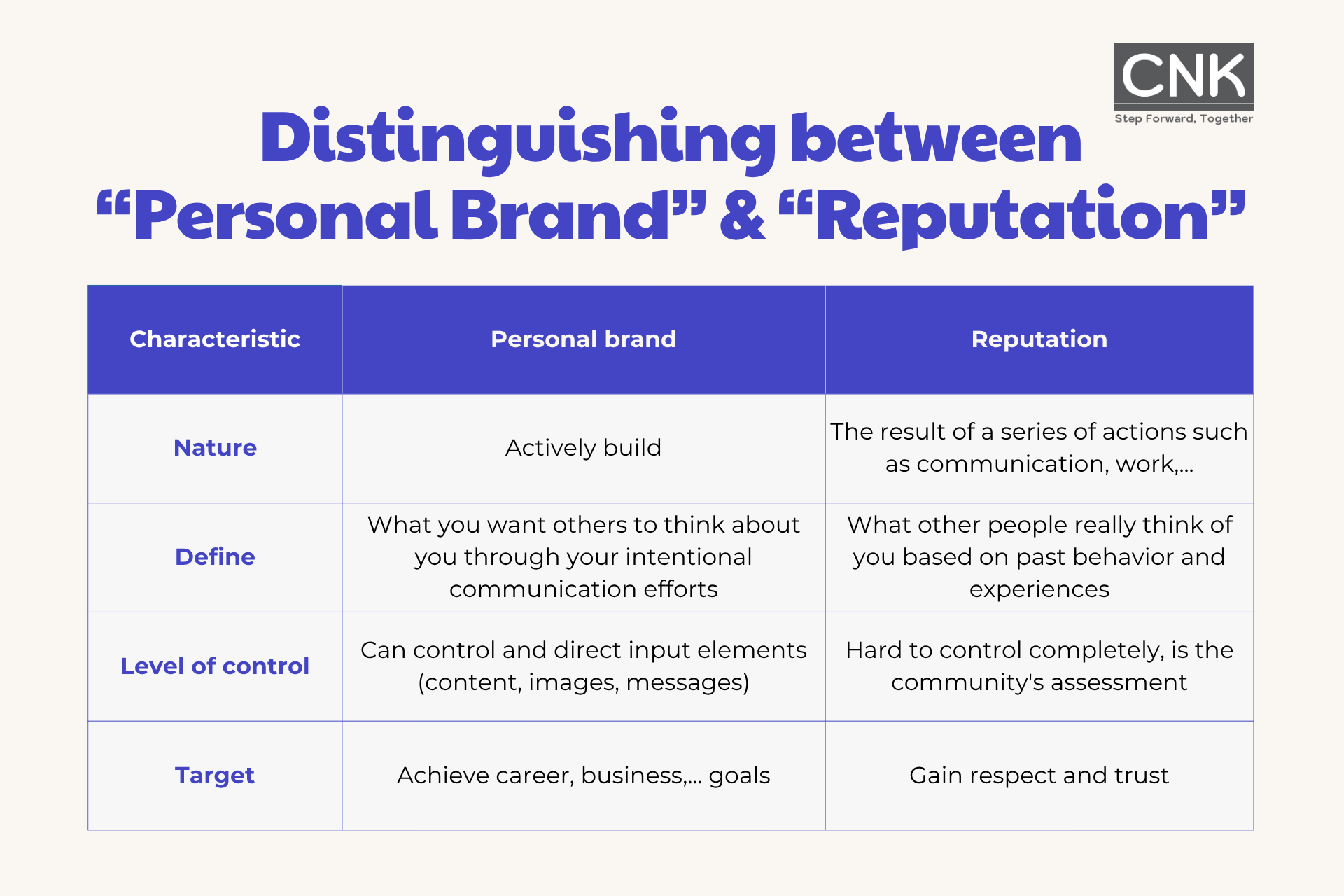
The importance and benefits of personal branding
Nowadays, the job market is increasingly competitive, personal branding is no longer an option, but a key factor determining long-term development and success.
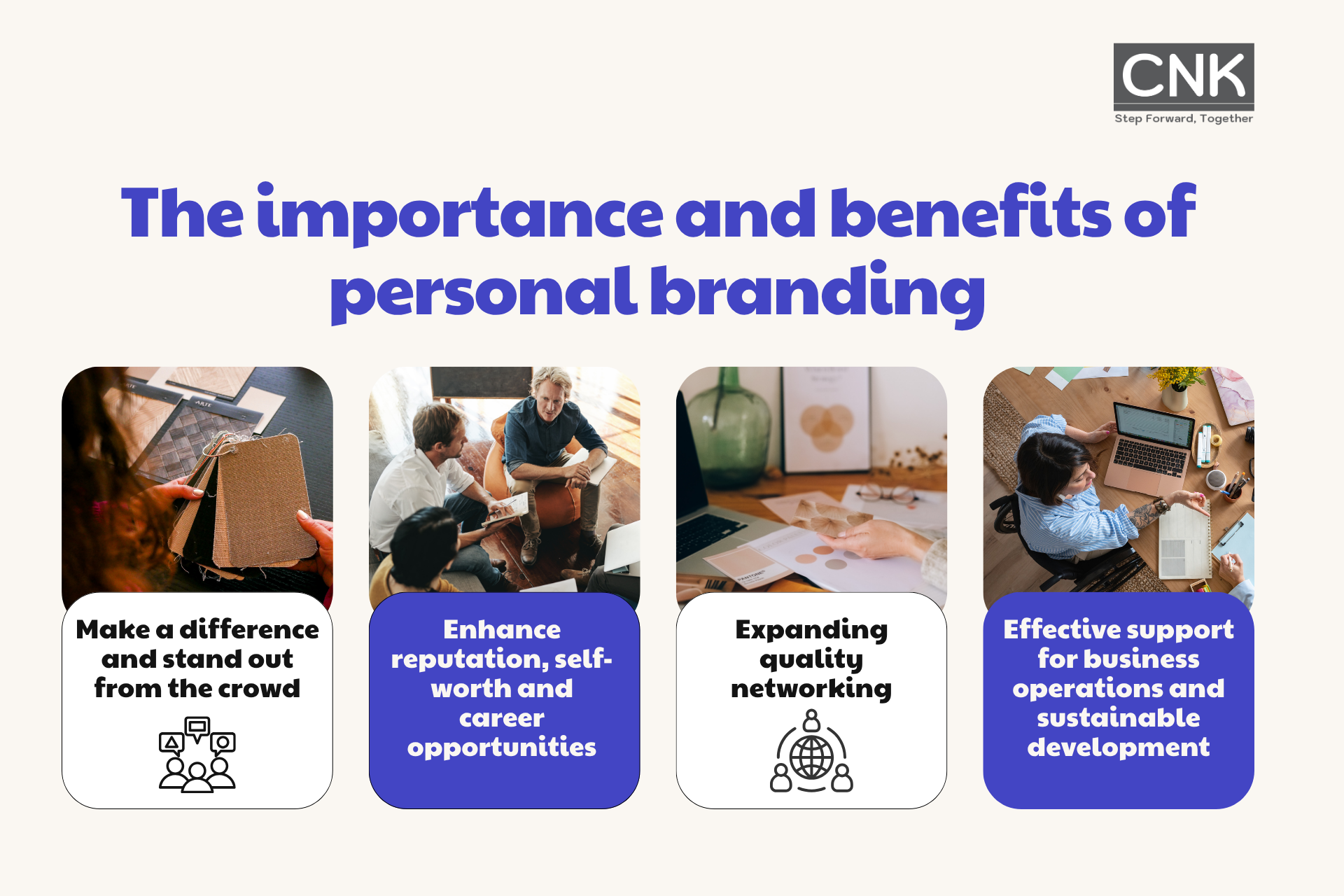
Make a difference and stand out from the crowd
To stand out from the crowd, it is not enough to be remembered or to be good at your profession. It is important to build a difference – something that helps others recognize, remember and choose you. Personal branding is the tool that helps you do that, by clearly defining your own value and communicating it consistently and professionally.
Who are you when you are surrounded by good people?
No matter what field you are working in, you will meet many people with solid expertise and rich experience, making it more challenging than ever to create a personal mark. Therefore, building a personal brand becomes a decisive factor to help you identify your core difference. When you know how to highlight this unique value, you will easily create your own mark, attract opportunities and affirm your position in the field you pursue.
Easily recognized and remembered
A strong personal brand is always associated with a clear message and a consistent image. When you present yourself professionally and consistently, others will quickly identify you with a specific field, such as “She is an expert in Digital Marketing” or “He is the best at process optimization”. This not only increases personal recognition but also strengthens brand credibility and trust in the eyes of the community.
Enhance reputation, self-worth and career opportunities
When you consistently share useful knowledge and keep your promises, you are “putting your trust” in your bank of credibility. The more trust you accumulate, the stronger your personal brand becomes, and this brings many tangible benefits:
- Faster promotion: Up to 80% of employers believe that personal branding is an important factor when evaluating and selecting candidates.
- Increase your income: When you are seen as an expert in your field, you can price your services or products higher, as others are willing to pay for prestige and quality.
- Attract opportunities naturally: Once your reputation is built strong enough, opportunities for collaboration, projects or invitations to share your expertise will come to you.
Expanding quality networking
Having a strong personal brand not only attracts attention but also creates meaningful connections. Instead of connecting randomly, you will easily reach out and connect with people who share the same vision, values and influence in the industry. From there, your personal brand becomes a “bridge” that helps you:
- Building a community: Form a group of people who believe, support and spread the message and values you pursue.
- Establish strategic partnerships: Connect with prospects, experts or consultants based on existing reputation and trust.
Effective support for business operations and sustainable development
A strong personal brand not only helps you create a personal mark but also becomes an important lever for business development. Especially for leaders, founders or sales experts, personal brand is the most effective and reliable marketing tool.
- Leverage for businesses: When leaders have a prestigious and professional personal image, businesses will easily build trust with customers, partners and investors.
- Increase product credibility: Customers tend to trust and choose products from people they feel they can trust. A strong personal brand helps increase the ability to make quick purchasing decisions.
- Attracting and retaining talent: Leaders with positive personal brands often inspire their teams, making it easier for businesses to attract and retain talented employees who share the same vision.
- Ensuring sustainable development: Unlike tangible assets, personal brand is an intangible but sustainable value. Even if you change jobs or environments, the reputation, relationships and trust you have built will always accompany you, creating a foundation for long-term development.
5-step process to build an effective personal brand from A to Z
Building an effective personal brand is not a matter of chance or luck, but a journey with strategy, clear direction and purpose. When you understand your goals and core values and know how to convey them consistently, your personal brand will truly develop its power and create a lasting impression.
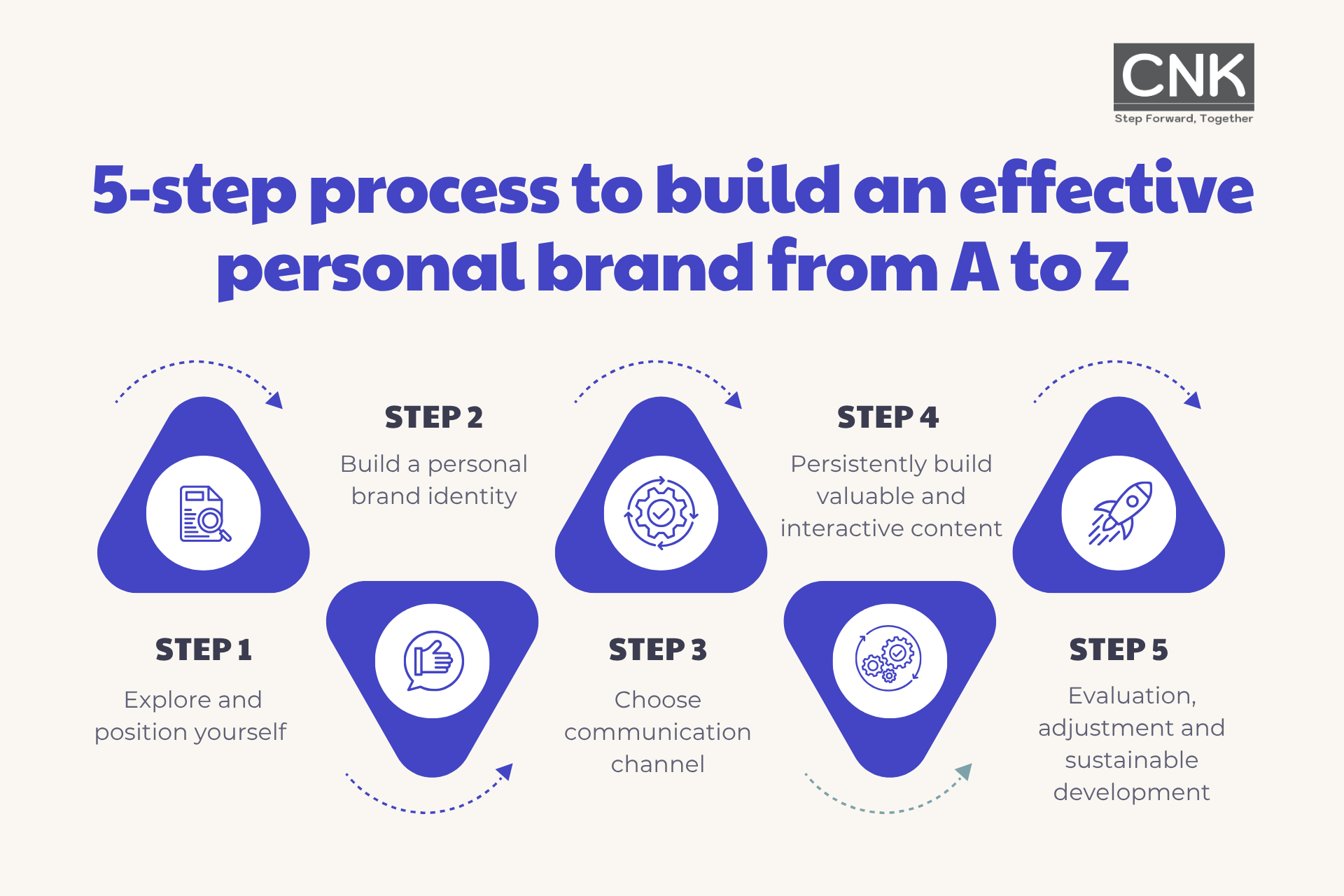
Step 1: Explore and position yourself
Self-discovery and self-positioning is the fundamental step, answering the question: “Who are you and how do you want others to think of you?”
- Personal Analysis: Use the SWOT model (Strengths, Weaknesses, Opportunities and Threats) to evaluate yourself. This analysis helps you identify your core competencies and areas that need improvement for more comprehensive development.
- Identify your niche: Don’t try to reach everyone. Instead, find a niche that you are truly knowledgeable and passionate about. For example, instead of just saying “Marketing,” you can focus on “Short-form Video Marketing for the F&B Industry.”
- Define your target audience: Be clear about who you want to attract. This could be middle managers, startups, or recent college graduates. Once you understand your audience, it will be easier to create the right content and message.
- Establish a core message: Summarize your brand identity in 1-2 short, clear, and memorable sentences that say “who you are?” and “what value you bring?” For example: “I help leaders build and manage effective remote teams.”
Step 2: Build a personal brand identity
Once you’ve clearly defined your core values and messages, the next step is to create a consistent image and tone of voice so your personal brand is recognizable and professional across all platforms.
- Build a professional image: Make sure your profile picture, cover photo, and design across your social media channels are high quality, professional, and consistent with your message.
- Consistent Voice: Determine how you want to be perceived as a trusted guide, friend, or insightful expert. Whether you’re writing a blog post or responding to an email, your voice needs to be consistent and reflect your brand personality.
- Collect “social proof”: Actively collect and present positive feedback, testimonials from customers, colleagues or partners along with achievements, certificates, outstanding projects. This is an important factor to help strengthen your reputation and increase the trust of your personal brand.
Step 3: Choose communication channel
You don’t need to be everywhere, just focus on where your target audience is most active:
- LinkedIn: Suitable for professionals, B2B and building professional relationships.
- Tiktok/Instagram/Youtube: Suitable for creating entertainment content or sharing with short videos.
- Blog/Website: A place to showcase your expertise, where you have full control over the content and data.
You need to have a clear content strategy, focused on solving problems for your target audience. You can apply the content formula “Educate – Inspire – Entertain”, providing knowledge, evoking emotions while creating intimacy and attracting followers naturally.
Step 4: Persistently build valuable and interactive content
This is the stage where you nurture trust and build a community around your personal brand. Creating quality content needs to be done consistently, strategically, and always aimed at providing real value to your target audience.
- The 80/20 Rule of Value: Spend 80% of your content sharing knowledge, experience and providing practical value to your followers. And use the remaining 20% of your content to introduce yourself or promote your products and services. This approach helps you build trust and create a natural rapport with your readers.
- Be consistent with frequency: You need to set a regular posting schedule (e.g. 2 posts/week or 1 video/month) and stick to it strictly to create a habit for your followers.
- Interaction: Be proactive in responding to comments, asking questions, sharing your opinions, or joining in on discussions in your area of expertise. This is the most effective way to turn your followers into a loyal community, and it helps your personal brand become more relatable, trustworthy, and truly influential.
Step 5: Evaluation, adjustment and sustainable development
A personal brand is a living system of values that needs to be continuously evaluated, adjusted and developed according to each stage of your career and experience. In the process of building a personal brand, you need to continuously:
- Measure performance: Closely monitor metrics like follower growth, engagement, number of new opportunities or collaboration offers, and especially the quality of new relationships.
- Listen to feedback: Pay attention to negative and positive feedback and adjust your content and image accordingly.
- Continuously innovate: Don’t be afraid to change and evolve as you achieve new things. A successful personal brand is one that evolves, reflecting your maturity, influence, and growing value over time.
Common mistakes when building a personal brand and how to fix them
Early identification of common mistakes in the process of building a personal brand will help you avoid wasting time and effort and orient your development strategy more effectively, thereby shortening the path to success and sustainable reputation.
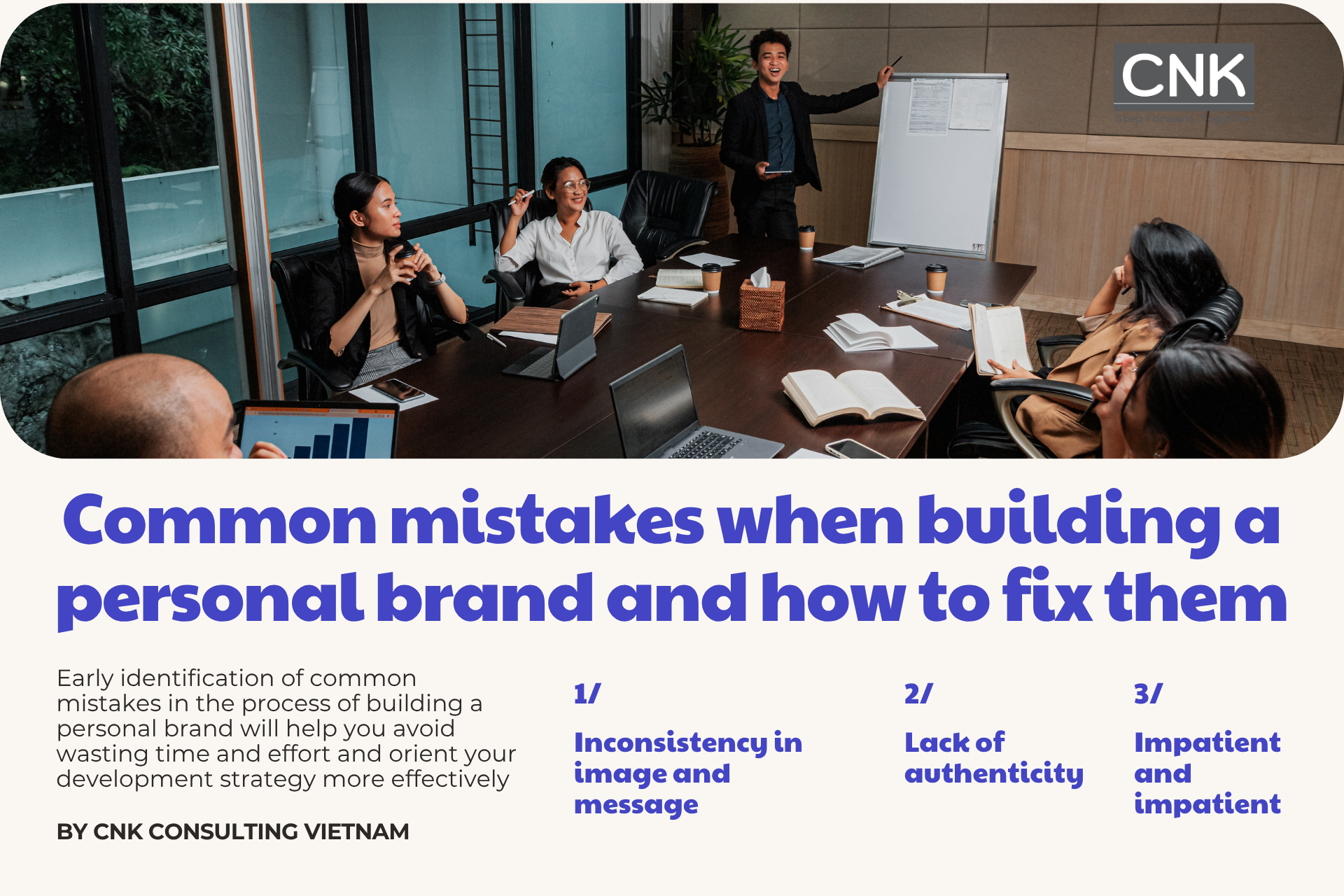
Inconsistency in image and message
A common mistake is that the content is not consistent. For example: On the first day, your content is about financial issues, on the second day you share your perspective on marketing, on the third day you create content about cooking, etc. This makes it difficult for readers to recognize and remember you, confuses your brand image, and reduces trust.
How to fix: Choose a consistent theme and keep your tone and core messaging consistent across all platforms so your brand is clear and recognizable.
>> Learn More: How to Write Your Personal Branding Statement (With Examples)
Lack of authenticity
When trying to imitate other KOLs, hiding weaknesses and only showing off achievements, the audience will feel distance, difficulty connecting and lack of trust.
Solution: Focus on authenticity by sharing your failures, your imperfect perspective, and your true interests. The golden rule is: “be yourself, the best version of you.”
Impatient and impatient
When you expect to see a massive increase in followers in just a few weeks and give up after your first post doesn’t get much engagement, your audience won’t have time to get to know you. This will make your brand forgettable and fail to build long-term trust.
Solution: Understand that building a personal brand is a long-term process, taking at least 6-12 months to see noticeable results. Focus on providing consistent value, and be consistent and persistent, as trust and credibility are built over time.
Conclusion
Understanding what personal branding is, you can proactively shape your values, image and reputation to stand out from the crowd, build trust with partners, customers and the community. A strong personal brand not only opens up career and business opportunities but also helps you develop sustainably in the long term.
To build a personal brand in a systematic, effective and time-saving way, you can refer to the personal branding service of CNK Consulting Vietnam – a place that helps you transform personal value into real prestige and professional mark.
CNK Consulting Vietnam
Hotline: +84 961 393 798
Email: info@cnk-consulting.com.vn
Address: 9 No. 07 New urban area Bac Dai Kim Expansion, Dinh Cong, Hoang Mai, Hanoi


